Echoes The Compilation
|
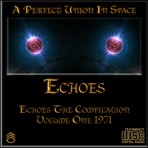
CD 1: 1971 |
A Perfect Union In Space
1. Echoes 1971-05-15 (Crystal Palace
Garden Party London, Echoes Of a Distant Time Atomic Cow Recordings ACR-011)
2. Echoes 1971-09-18 (Black Wizard/ White Witch Live In Montreaux, Pitch
Corrected Version)
3. Echoes 1971-10-10 (One Of These Days In Bradford Free Range Pigs Great
Hall, Bradford University, Yorkshire) |
|
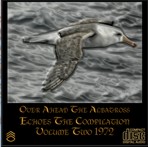
CD 2: 1972 |
Over Ahead The Albatross
1. Echoes 1972-01-20 (The Brighton Dome Brighton, England
"HERE THEY COME" (LPP))
2. Echoes 1972-05-21 (Open Air Festival Germersheim Germany Calling
Number 228 (MoLM))
3. Echoes 1972-11-15 (Sporthalle, Böblingen, West Germany the 2/3
Böblingen tapers updated November 10 2003 - Buffalofloyd speedcorrected
version) |
|
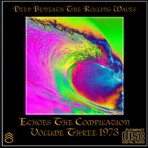
CD 3: 1973 |
Deep Beneath The Rolling Waves
1. Echoes 1973-03-18 (Radio City Reeling Pink Floyd CD
source (re-mastered by Sgt Weatherman))
2. Echoes 1973-05-19 (Earls Court Exhibition Hall, London, England
Reeling Pink Floyd DVD-6 Tape 26)
3. Echoes 1973-10-13 (Stadthalle Wien, Austria low gen mono audience tape
NOT bootleg LP or CD sourced. finkployd49) |
|
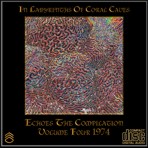
CD 4: 1974 |
In Labyrinths Of Coral Caves
1. Echoes 1974-06-22 (Colmar Parc Des Expositions HRV CDR
002 Rev A)
2. Echoes 1974-11-17 (Empire Pool, Wembley, London Decline and fall of
the british empire (Sigma 29))
3. Echoes 1974-12-14 (The Hippodrome Bristol, England Reeling Pink Floyd
CD Source (2nd generation)) |
|
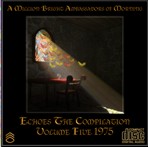
CD 5: 1975 |
A Million Bright Ambassadors Of Mornings
1. Echoes 1975-04-13 (Cow Palace, San Francisco, CA YGBC (speedcorrected
and resampled by Rudy))
2. Echoes 1975-06-22 (County Stadium Milwaukee low gen-DAT (Recorder 2) (DVD
1 - Tape 4))
3. Echoes 1975-06-28 (Ivor Wynne Stadium, Hamilton, Ontario, Canada -
Direct from 1st Gen Cassettes 24bits @ 96kHz > 16bits@44.1Hz Sony Soundforge
8) |
|
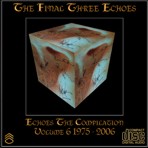
CD 6: The Final Echoes |
The Final Three Echoes
1. Echoes 1975-07-05 (Knebworth Festival Knebworth Park
Hertfordshire England "Yesterday's Triumph" Pinkroioshn CDR-010
(PRS-CDR-010))
2. Echoes 1987-09-25 (Rosemont Horizon, Rosemont, Illinois, USA "The
Final Echoes")
3. Echoes 2006-08-26 (Dave Gilmour) (Gdansk Shipyard, Gdańsk Poland "(Sit
Down,) Make Yourselves Comfortable" SNS-MR-005)
4. Albatross 2008-08-11 (Dave Gilmour) (Jools Holland Radio Show) |
Overhead the albatross hangs motionless upon the air
And deep beneath the rolling waves in labyrinths of coral caves
The echo of a distant tide
Comes willowing across the sand
And everything is green and submarine
And no one showed us to the land
And no one knows the where's or why's
But something stirs and something tries
And starts to climb towards the light
Strangers passing in the street
By chance two separate glances meet
And I am you and what I see is me
And do I take you by the hand
And lead you through the land
And help me understand the best I can
And no one calls us to move on
And no one forces down our eyes
And no one speaks
And no one tries
And no one flies around the sun
Cloudless every day you fall
Upon my waking eyes
Inviting and inciting me to rise
And through the window in the wall
Comes streaming in on sunlight wings
A million bright ambassadors of morning
And no one sings me lullabies
And no one makes me close my eyes
So I throw the windows wide
And call to you across the sky.
Original Lyrics
Planets meeting face to face One to the other cried how sweet
If endlessly we might embrace
A perfect union deep in space
If heaven might this once relent
And give us leave to shine as one
Our two lights here forever one light blended
And in that longing to be one
The parting summons sound is drawn
I see you've got to travel on
And on and on around the sun
Song by Pink Floyd
Album Meddle
Released October 30, 1971 (US); November 5, 1971 (UK)
Recorded January 1971 Abbey Road, London
March, April 1971 AIR Studios, London
May 1971 Morgan Studios, London
June, July 1971 Morgan Studios, London; AIR Studios, London
August 1971 AIR Studios, London
Writer Roger Waters, Richard Wright, Nick Mason, David Gilmour
"Echoes" is a song by Pink Floyd, including lengthy
instrumental passages, sound effects, and musical improvisation. Written by all
four members of the group (Roger Waters, Richard Wright, David Gilmour, and Nick
Mason), "Echoes" provides the extended finale to Pink Floyd's album Meddle. The
track has a running time of 23:31 and takes up the entire second side of the
vinyl recording. It is widely considered one of Pink Floyd's most ambitious and
musically diverse compositions.
It also appears in shortened form as the fifth track on the compilation album
which took its name, Echoes: The Best of Pink Floyd. "Echoes" is the
third-longest song in Pink Floyd's catalogue, after "Atom Heart Mother" (23:44)
and the combined segments of "Shine On You Crazy Diamond" (26:01). Unlike those
pieces, it is not explicitly divided into separate parts; however, the
composition was originally assembled from separate fragments, and was later
split in two parts to serve as both the opening and closing numbers in the
band's film Live at Pompeii.
The composition uses many progressive and unconventional
musical effects.The ping sound heard at the beginning of the song was created as
the result of an experiment at the very beginning of the Meddle sessions. It was
produced through amplifying a grand piano and sending the signal through a
Leslie rotating speaker. Gilmour used the slide for certain sound effects on the
studio recording, and for the introduction in live performances from 1971 to
1975. A throbbing wind-like sound is created by Waters vibrating the strings of
his bass guitar with a steel slide and feeding the signal through a Binson
Echorec. The high pitched electronic 'screams', resembling a distorted whale
song, were discovered by Gilmour when the cables were accidentally reversed to
his wah pedal. The "choral" sounding segment in the middle of the song was
created by placing two tape recorders in opposite corners of a room; the main
chord tapes of the song were then fed into one recorder and played back while at
the same time recording. The other recorder was then also set to play what was
being recorded; this created a delay between both recordings, heavily
influencing the structure of the chords while at the same time giving it a very
"wet" and "echoey" feel. Harmonic "whistles" can be heard produced by Wright
pulling certain drawbars in and out on the Hammond organ. Rooks were added to
the music from a tape archive recording (as had been done for some of the band's
earlier songs, including "Set the Controls for the Heart of the Sun"). The 2nd
half of the song where Gilmour plays muted notes on the guitar over Wright's
slowly-building organ solo was inspired by the Beach Boys song "Good Vibrations".
The song concludes with a rising Shepard-Risset glissando.
Early versions
The piece had its genesis in a collection of musical experiments written
separately by each band member, referred to as "Nothing, Parts 1-24". Subsequent
tapes of work in progress were labelled "The Son of Nothing" and "The Return of
the Son of Nothing"; the latter title was eventually used to introduce the
as-yet unreleased work during its first live performances in early 1971.
During this stage of its development, the song's first verse had yet to be
finalized. It originally referred to the meeting of two celestial bodies, but
perhaps because of Waters' increasing concerns that Pink Floyd was being
pigeonholed as a space rock band, the lyrics were rewritten to use underwater
imagery instead.
The title "Echoes" was also subjected to significant revisions before and after
the release of Meddle: Waters, a devoted football fan, proposed that the band
call its new piece "We Won the Double" in celebration of Arsenal's 1971 victory,
and during a 1972 tour of Germany he jovially introduced it on two consecutive
nights as "Looking Through the Knothole in Granny's Wooden Leg" (a reference to
The Goon Show; the phrase appeared in an episode titled "The ú50 Cure") and "The
March of the Dam Busters", respectively.
Live performances
The song, then entitled "The Return of the Son of Nothing", was first performed
in public on April 22, 1971 at the Lads Club in Norwich, England, with the
unrevised 'planetary' lyrics. These remained in place until September of that
year, when they were replaced by the more familiar 'albatross' lyrics. The song
was first introduced as "Echoes" on the sixth of August, 1971, at a performance
in Japan. It was a staple of Pink Floyd's live performances from then until 1975
and was also played eleven times in 1987, near the beginning of the A Momentary
Lapse of Reason tour. Most recently, David Gilmour has performed the song on his
2006 solo tour.
Unlike the Atom Heart Mother suite, it was relatively easy for Pink Floyd to
reproduce "Echoes" onstage (as can be seen in the Live at Pompeii film) without
requiring additional musicians, though the swapping of keyboard sounds during
the piece sometimes proved problematic in live performances. Originally, Wright
would start the song by playing his grand piano through a Leslie speaker, then
switch to the Hammond organ just before the first verse, switch again to the
Farfisa organ for the re-entry after the 'seagull' middle section, back to the
Hammond again for the last verse, and finally to piano for the outro. This
required Roger Waters to provide the piano 'pings' at their re-entry after the
middle section. The Farfisa was later dropped from the band's live keyboard
setup and all its parts were played on the Hammond instead. The 1987
performances had synthesizers replacing the Farfisa. Unlike Pompeii, regular
live performances played the song as a whole - the bridge between "Part 1" and
"Part 2" was simply done by Waters stopping the bass riff of the jam section in
the former and starting to play the wind sounds of the latter. The rest of the
band would just play quieter and quieter until silent. Live performances
featured Roger playing his bass for the intro, rather than Gilmour's guitar.
Starting in 1974, the musical arrangement was augmented by backing vocals from
Venetta Fields and Carlena Williams and saxophone solos by Dick Parry added
directly after the second verse and at the song's finale. All three of these
additional artists joined Pink Floyd's touring party to take the latter Dark
Side of the Moon performances, and added their own parts to the remainder of the
concert (largely because the former artist was reluctant to leave and re-enter
the stage throughout the show). The last time the song was played by all
four members of Pink Floyd was at the concert in Knebworth closing their 1975
world tour. During performances given by the 'three-man' Pink Floyd in 1987, "Echoes"
was played in a much shorter form than usual (with Gilmour singing the higher
harmonies instead of Wright and Wright singing Gilmour's original harmonies). It
was ultimately dropped from the set (and replaced with "Shine On You Crazy
Diamond (Parts 1-5)") because Gilmour did not feel 'right' about singing the
lyrics at the time, and his backing artists played its music without the touches
of improvisation that make "Echoes" a powerfully affecting piece.
On Gilmour's 2006 tour in support of On An Island, Wright played a key part in
the touring band, performing the vocals and keyboard parts on "Echoes" (he sang
in the same pitch as Gilmour originally did (this time melding with Gilmour) and
Jon Carin singing the higher harmonies that Rick originally sang in 1970s
performances). This new arrangement of the song is close to full-length (Often
clocking at 22 minutes at the beginning of the tour, later performances even
outlengthed the studio version by sometimes three minutes.) It also saw the
return of Rick's Farfisa organ, which was pulled out of storage and brought on
tour specifically for "Echoes." There is a full performance of Echoes on
Gilmour's DVD Remember That Night, taken from the Royal Albert Hall. This
performance clocks in at 22:18. The 2008 Gilmour CD+DVD release Live in Gdansk
also contains a full performance of Echoes, this time clocking in at 25 minutes.
Following Wright's death in 2008, Gilmour appeared on Jools Holland's programme,
Later, in tribute (Wright had been planning to appear alongside Gilmour, who
performed Remember a Day) and said that it was very sad but he didn't think he
would ever perform Echoes again, without Rick.
Echoes and the 2001: A Space Odyssey synchronization rumours
Similar to the the Dark Side of the Rainbow effect, it is rumoured that "Echoes"
synchronizes with Stanley Kubrick's 1968 film 2001: A Space Odyssey when played
concurrently with the final segment (entitled "Jupiter and Beyond the Infinite").
"Echoes" was released 3 years after the film and is 23 minutes and 31 seconds in
length, similar to the "Infinite" segment. Sounds in the middle part of the song
suggest to some listeners the feeling of travelling through an alien world. The
drone vocalizations heard in the final scenes of 2001 seem to match with the
discordant bass vibrations in the middle of "Echoes" as well the choral
glissandos of its finale. Some argue that there are moments when the song and
film soundtrack are nearly indistinguishable. Another notable link occurs during
a change in scene at precisely the moment when guitar and keyboards crescendo as
the lyrics re-enter for the final verse. Almost as a bonus, the early lyrics
contain references to planets, which seems entirely suitable for the film's
depiction of Jupiter and its moons. Adrian Maben re-created this marriage of
music and image in his director's cut of Live at Pompeii using CGI.
The members of the band always denied that the synchronization was intentional.
Furthermore, the technology to play back film in a recording studio circa 1971
would have been expensive and difficult for the band to acquire. Roger Waters is
sometimes quoted as saying that the band's failure to contribute music on 2001's
official score was his "greatest regret".
The 1973 George Greenough film "Crystal Voyager" concludes with a 23 minute
segment in which the full length of "Echoes" accompanies a montage of images
shot by Greenough from a camera mounted on his back while surfing on his
kneeboard.
Alleged plagiarism
In interviews promoting Amused to Death, Waters asserted that Andrew Lloyd
Webber had plagiarized themes from "Echoes" for sections of the musical The
Phantom of the Opera; nevertheless, he decided not to file a lawsuit regarding
the matter.
Yeah, the beginning of that bloody Phantom song is from Echoes. *DAAAA-da-da-da-da-da*
. I couldn't believe it when I heard it. It's the same time signature - it's
12/8 - and it's the same structure and it's the same notes and it's the same
everything. Bastard. It probably is actionable. It really is! But I think that
life's too long to bother with suing Andrew fucking Lloyd Webber.
Waters did, however, respond by adding an insulting reference to Webber in the
song "It's a Miracle" on the Amused to Death album.
Tribute
The Beastie Boys' "Gratitude" music video reflects and tributes "Echoes" from
Live at Pompeii. "Pink Floyd London" is painted on the back of the amp when the
camera rotates behind the band. There are also shots of rotating Leslie speakers.
Source:
http://en.wikipedia.org/wiki/Echoes_%28Pink_Floyd_song%29
Added: 23.08.2009









